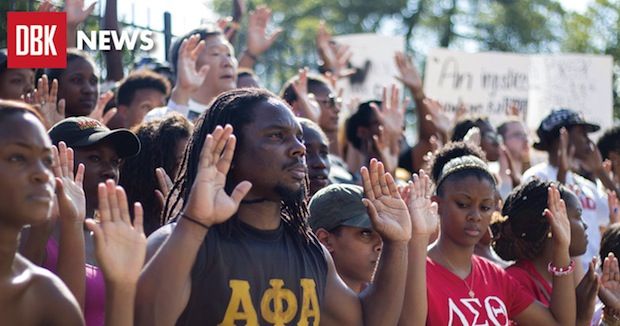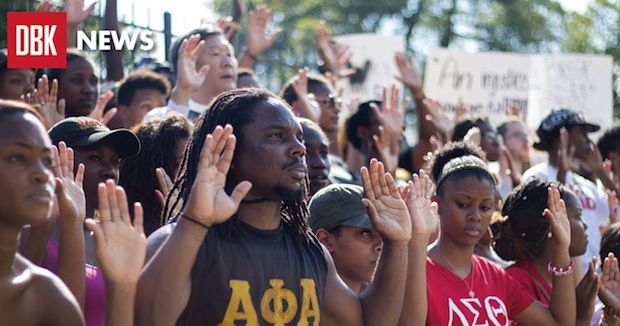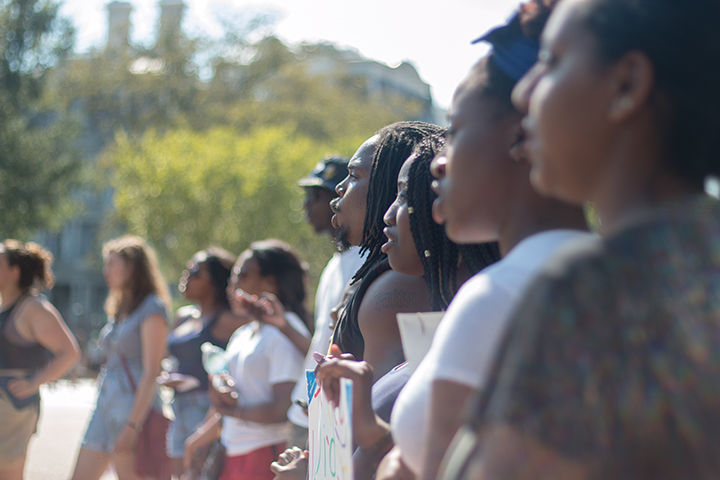The 94-degree heat didn’t stop dozens of university and local students from marching in Washington on Saturday, chanting the words that have become a rallying cry in Ferguson, Missouri, over the past month: “Hands up, don’t shoot.”
The Black Alliance Network, a group of executive members from every black student organization on the campus, hosted the march in front of the White House North Lawn to peacefully assemble and call for justice. The group denounced police brutality and unwarranted gun use in light of the Aug. 9 death of Michael Brown, an 18-year-old black man shot and killed by a white police officer in Ferguson.
Attendees formed a circle at about 3 p.m. Saturday to listen to senior Colin Byrd, social advocacy committee chairman of the Black Student Union, explain the philosophical motivation for the march.
“We have the obligation to not remain silent,” Byrd, a National Association for the Advancement of Colored People member, said to the crowd. “It’s our time to stand up and fight with justice.”
The march was specifically aimed at advocating legislation that would require all police officers to wear cameras on their person, Byrd said, as well as laws against unwarranted police violence.
“Progress takes time,” said Byrd, a sociology major. “Human dignity and life is what it’s about. It’s not about black versus white; it’s about wrong versus right.”

Senior communication major Samira Jackson, vice president of public relations for the Black Student Union, primarily led the march that proceeded around Lafayette Square and in front of the White House for about 25 minutes. Jackson brought a megaphone to lead call-and-response chants such as “No justice? No peace,” “Police brutality must end” and “For change in our nation, we need legislation.”
Members of the Black Student Union, this university’ chapter of the NAACP, African Student Progressive Action Committee, Community Roots and some members from Greek life organizations came to support the movement. The march also garnered support from onlookers and students from American University and Howard University.
Toward the end of the march, a group of protesters seeking support and answers for the Sewol ferry accident in South Korea approached the group to ask if they could join together in solidarity.
“We appreciate everybody coming out and making a statement here,” Jackson said. “We got some support from outside schools and people who were just in the park … it just shows that we have a really good Terp community here.”
Students marched while holding signs that read “Black lives matter,” “Being a black male is not a crime,” and “Protect and serve, not oppress and kill.” One sign, however, had a different message: “Did you register to vote? If not … see us!”
This campus’ NAACP chapter also encouraged people to register to vote at the march, giving out registration forms and information on where to learn more about the process. Ceaira Thomas, a junior economics major and treasurer of the group, said it’s important to vote in the midterm elections so students can put people in office who will work toward legislation against these issues.
“We have an advantage living so close to the White House,” Thomas said. “So we wanted to be able to come out here and protest peacefully and make a statement.”
Police brutality and unwarranted gun use have been problems for a while, said BSU president Jazmyn White, but it took events like those in Ferguson to make everyone aware of it. She said the march exceeded her expectations, but it doesn’t stop there for the BSU’s action toward awareness — she plans to host community events on the campus to discuss it.
“This is something that we’re going to carry on,” the senior computer science and economics major said. “The more people know about this issue, the more change can be effected.”
Ifeanyi Uzoukwu, a senior English major, said it “hurts” him that the deaths of people such as Michael Brown and Eric Garner, an unarmed 43-year-old black man whose death was ruled a homicide after police placed him in a chokehold while arresting him in July, can happen in broad daylight without consequences.
“Equality is something that’s universal,” Uzoukwu said. “I came out here today because it was opportunistic — I knew that I wanted to do something to support the movement because I know that what happened wasn’t right.”
Uzoukwu also noted the importance of advocating the use of body cameras by campus police in addition to city police, which he said would better protect students and decrease the chances of any injustices from occurring.
While some students heard about the protest and chose not to come, any diversity movement is beneficial and can inspire others to initiate change, Uzoukwu said.
“We’re not exactly where we want to be yet, but this is a stepping stone,” Uzoukwu said. “And I’m really proud of that stepping stone.”
The members of the rally hosted by the Black Alliance Network march in front of The White House on Saturday, September 6.
“Progress takes time,” said Colin Byrd, a senior sociology major. “Human dignity and life is what it’s about. It’s not about black versus white; it’s about wrong versus right.”





